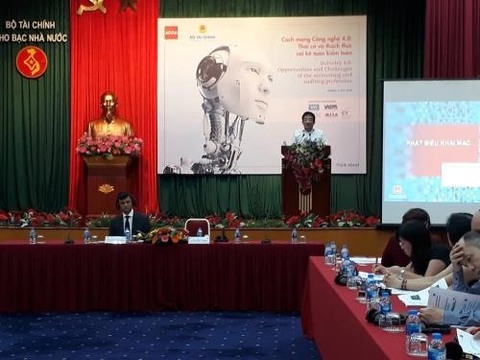
Accounting is one of the leading fields in the application of information technology, said Dang Van Thanh, chairman of the Viet Nam Association of Accountants and Auditors . — Photo bnews.vn
Accounting is one of the leading fields in the application of information technology, said Dang Van Thanh, chairman of the Viet Nam Association of Accountants and Auditors (VAA).
The Department of Accounting and Auditing Regulations, under the Ministry of Finance, and the Association of Chartered Certified Accountants (ACCA) co-organised a conference on opportunities and challenges of the fourth industrial revolution to the accounting and auditing sector in Ha Noi on Friday.
The accounting process has changed as most accounting practices now incorporate information technology, said Thanh. Big data technology enables fast and simple processing, allowing quick access to data in a short time, he said. Pham Sy Danh, chairman of the Viet Nam Association of Certified Public Accountants (VACPA), said according to VACPA’s survey, accounting and auditing firms agreed that the 4.0 technology revolution will have a large influence on the sector.
The technology would be a tool for accounting and auditing firms to not only improve quality and services but also expand markets to other countries thanks to the internet, he said.
New technology also facilitates data exploitation and improves the reliability of reporting through automated on-demand auditing and accounting systems. In the next three to 10 years, smart software and systems will replace manual work, automate complex processes, support outsourced services and internally re-use some services.
Sharing experiences of other countries, Narayanan Vaidyanathan, head of ACCA’s business insights, said that the use of cloud computing in accounting was already developed in other countries due to the ability to access information everywhere.
However, the fourth industrial revolution poses major challenges on security, firstly in the security of accounting information management and payment and investment activities.
This requires financial systems which can ensure security and privacy in financial and accounting information. To actively utilise the advantages as well as limit the impacts of the revolution, VAA chairman Dang Van Thanh said that it was necessary to innovate and set up accounting processes to collect, process and import accounting documents, as well as processing and exporting information. The chairman also noted the necessity of enhancing the usefulness of accounting information through the application of information technology in analysing and evaluating accounting information.
At the same time, it is necessary to identify and evaluate the risks of information and accounting data when connecting to the internet, he said.
Earlier this week, The Ministry of Finance also organised a workshop on the integration journey of Industry 4.0 and transformation of digital Government in finance sector.
The industrial revolution 4.0 brings many opportunities and challenges to countries, especially developing countries like Viet Nam, in applying digital technology, with new production and business models to promote economic development.
To take advantage of opportunities and limit the challenges brought about by Industry 4.0, the synchronous promulgation of mechanisms and policies on the development of Industry 4.0- related agencies and sectors is important.
The tax and financial policy system plays an important role in mobilising, allocating resources and supporting enterprises, organisations and individuals to participate in Industry 4.0.
At the workshop, Dang Duc Mai, director of the Department of Financial Informatics and Statistics (Ministry of Finance), said that the financial sector was in the process of approaching the initial phase of e-government, which is the building of e-Government and e-Finance.
The financial sector has been focusing on researching and studying models and solutions of digital government transformation of countries, including determining suitable objectives and roadmaps for the sector, Mai said. The Ministry of Finance is concentrating resources to carry out tasks of building e-Government architecture at the Ministry of Finance, with the orientation of the digital transformation and implementation of the national database on finance.
In March, the Ministry of Finance issued a resolution on the application of technology in the fourth industrial revolution in the field of finance with the objective of actively applying the achievements of the industrial revolution, building smart governance platforms, providing smart financial services and actively participating in the development of a digital economy. The ministry plans to complete the building of e-finance and the establishment of a modern, sustainable, open and transparent digital finance platform based on big data, open financial data and digital finance ecosystems by 2025.
The financial sector will play the role of creating, connecting, sharing data and digitalised platforms, meeting the needs of public financial transactions, the need to exploit and use digital information of the Government and people, businesses and organisations. — VNS